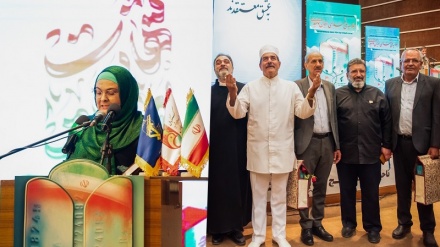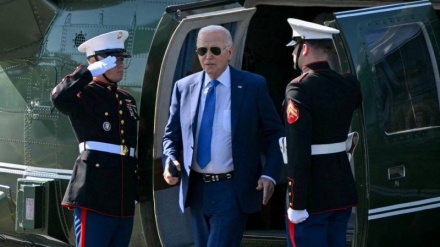'Godfather' US bullying other countries into submission
The US, which could rightly be called the godfather of terrorists, has a bleak, black and bloody record of violating commitments, breaking promises, breaching accords, and browbeating weak countries into submission.
The latest example in this regard, beside the blatant support for Takfiri terrorists in Syria, the extension of the so-called ISA or Iran Sanctions Act for another ten years, despite the fact that Washington had given its word to waive all sanctions, following the JCPOA or Joint Comprehensive Plan of Action, as part of the 5+1 group of countries’ negotiations on Iran’s peaceful nuclear energy projects. We present you an analysis on this issue titled Godfather US Bullying other Countries into Submission, written by Dr. Ismael Hossein-Zadeh, an Iranian-born Professor Emeritus of Economics at Drake University, Iowa, US, whose articles on economic crises, NAFTA, Third World debt, the Political Economy of War, etc., have been widely published. Stay with us for his views on the US breaching of the JCPOA and the Congress's recent renewal of sanctions.
The US acts as the 'Godfather', bullying other countries into submission. Trade and investment between the US and France, for example, are so critically important to the French economy that it cannot afford to antagonize the US. Recently, the US Congress brought up the issue of renewing sanctions on the claim this is not a new set of sanctions, but a 'renewal of previous one'. Under point 26 of JCPOA, “The US Administration, acting consistent with the respective roles of the President and the Congress, had said it will refrain from imposing new nuclear-related sanctions.” It means this is an example of breaching the JCPOA. Without the least doubt, sections of the renewed/extended 10-year sanctions, or Iran Sanctions Act (ISA), are specifically nuclear related. These include sections 4.3.2 and 4.3.4, which are related to petroleum and its products:
“4.3.2. Sanctions on investment, including participation in joint ventures, goods, services, information, technology and technical expertise and support for Iran's oil, gas, and petrochemical sectors (ISA Sections 5(a) (1)-(2).”
“4.3.4. Sanctions on the export, sale or provision of refined petroleum products and petrochemical products to Iran (ISA Section 5(a) (3).”
It is obvious, then, that extended ISA does breach JCPOA.
The Obama administration, which was the signatory of the nuclear agreement, has already acted against its JCPOA commitments. Under the circumstances, the question arises: What can we expect from the new resident of the Oval office in this regard?
The answer is clear. President-elect Trump will most likely go along with both JCPOA and the extended ISA. The reason is that, using JCPOA, the US has achieved all its nuclear-related goals in Iran without given much in return. And the Trump administration would not be stupid to act against such a deal—Trump’s electioneering ranting against the deal notwithstanding.
Most US policies are self-contradictory, in view of the fact that the US had issued a license to France's Airbus for the sale of 106 planes to Iran, just months after the signing of the JCPOA. The question being asked is: Why is it that other nations need to count on US approval in order to work with Iran?
In this regard, we could say: Because other nations and their business entities (for example, Airbus) are afraid of severe US penalties and/or sanctions. In this sense the US acts as the metaphorical world godfather, bullying other countries into submission. Trade and investment between the U.S. and France, for example, are so critically important to the French economy that it cannot afford to antagonize the US.
In the email leaks known as “Podesta Emails” Clinton's policy advisors were urged to take tough measures against Iran. Part of an email to Jake Sullivan reads: “If the US itself believes Iran has cheated, as President, she [Hillary Clinton] would re-impose US sanctions, even if Russia-China-Iran say there was no violation. She would work to get the EU to also re-impose their sanctions.” When we go through these facts, the question arises: Is it safe to say US politicians have the mindset of not following their commitments in JCPOA? What’s could be said on the quote from the Podesta emails?
It is obvious that it is safe to argue that the US did not negotiate JCPOA in good faith. Indeed, the US focus on Iran’s nuclear technology was, from the beginning, a pretext, or a trap. Intelligence agencies of the US (and of the Zionist regime) were well aware of the fact that Iran was not pursuing a nuclear armament agenda. Nonetheless, the US and its allies used the issue as an excuse in order to gradually undermine Iran’s sovereignty and bring it to the fold of its “allies.” Curtailment of Iran’s nuclear technology was only the first item in this imperialist agenda.
AS/SS



